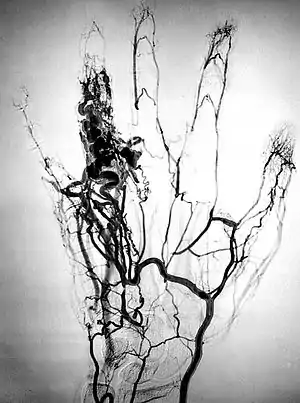Angioma
Angiomas are benign tumors derived from cells of the vascular or lymphatic vessel walls (endothelium) or derived from cells of the tissues surrounding these vessels.[1][2]
| Angioma | |
|---|---|
 | |
| Arteriography showing the blood vessels involved in an angioma of the ring finger | |
| Specialty | Dermatology |
Angiomas are a frequent occurrence as patients age, but they might be an indicator of systemic problems such as liver disease. They are not commonly associated with cancer.
Signs and symptoms

An infantile haemangioma, also called a strawberry angioma, on a child's arm
Angiomas usually appear at or near the surface of the skin anywhere on the body, and may be considered bothersome depending on their location. However, they may be present as symptoms of another more serious disorder, such as cirrhosis. When they are removed, it is generally for cosmetic reasons.
Types
- Capillary (simple)
- Cavernous (cystic)
- Glomus tumor
- Vascular ectasias
- Naevus flammeus
- Telangiectasia - Spider, Hereditary hemorrhagic
- Reactive vascular proliferations
References
- Robbins and Cotran, "Pathologic Basis of Disease", by Ninay Kumar, Abul K. Abbas, Nelson Fausto, 7th Edition, pages 545-547
- "angioma" at Dorland's Medical Dictionary
External links
This article is issued from Wikipedia. The text is licensed under Creative Commons - Attribution - Sharealike. Additional terms may apply for the media files.